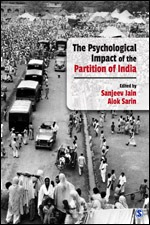United Nations High Commissioner for Refugees reported in 2017 that nearly 65 million people live outside of their homeland due to ongoing conflicts and persecution. This migration obviously is an imposed one. There are main areas causing concerns for the agencies looking after them. Firstly, their acceptance and integration into a hosting country. Secondly, the impact of violence they incurred and the last but not the least by any mean, the emotional impact of leaving the homeland. All these three issues are relevant in the case of migration, which resulted after the partition of Indian Subcontinent in 1947. A lot has been written about partition as the project of colonialism and the violence migrating people suffered. However, the emotional aspects of such uprootedness have been completely disregarded. Although, those emotional streaks are obvious and known but no serious professional effort has ever been done, until now.
The book, The Psychological Impact of the Partition of India edited by Sanjeev Jain and Alok Sarin is indeed the first attempt of its type. Being a student and practitioner of psychology, I never came across any such solid attempt ever before. At least two notions are very intriguing to me. One, the partition of minds and second is everydayness of partition discourse.
 The partition along with religious lines reinforced only one sense of identity and discounted other primary identities. Yes, the Muslims got a new homeland (though the book did not focus on Pakistan and Muslims as such) but what about Lacknawai, Dehlwi, Amrohavi and Amritsari identities for those who left their worthiness where they belonged to. A genius like Mantoo described the identity crisis in his all-time masterpiece, Toba Tek Singh. Now, we don’t know who we are. To avoid the frustration of not feeling comfortable with any identity, we found salvage in one, which was religious. The book eloquently describes the impact of reliance on only one source of identity and its impact on mental health through case reports. This emphasis on secondary identity (religious) created a clash within the immigrants and separated them from other identities; the result of this is right in front of us. Till to date, we could not reconcile with other ethnocultural identities. As soon as someone insists on other identities, we start considering them outsiders (ghaddar and kafir). This illustrates the connexion with the legacy of the partition of the Indian subcontinent was based upon. That is the main reason why both the States (Pakistan & India) till to date could not accept and learn to live with each other amicably as neighbours. The immigrants on at least in Pakistan, still, crave for the place they migrated from and feel triumphant on achieving a new country in the name of religion. Obviously, they are mentally partitioned and perplexed, and resultantly formed an ambivalent relationship even with their new country. If an individual could not reconcile with parallel but paradoxical mental streaks, cognitive dissonance and confusion is a definite outcome. Confusion, around who we are, a Jaat or a Muslim, when deciding about daughter’s marriage, creates a rift between two identities, is just an everyday example.
The partition along with religious lines reinforced only one sense of identity and discounted other primary identities. Yes, the Muslims got a new homeland (though the book did not focus on Pakistan and Muslims as such) but what about Lacknawai, Dehlwi, Amrohavi and Amritsari identities for those who left their worthiness where they belonged to. A genius like Mantoo described the identity crisis in his all-time masterpiece, Toba Tek Singh. Now, we don’t know who we are. To avoid the frustration of not feeling comfortable with any identity, we found salvage in one, which was religious. The book eloquently describes the impact of reliance on only one source of identity and its impact on mental health through case reports. This emphasis on secondary identity (religious) created a clash within the immigrants and separated them from other identities; the result of this is right in front of us. Till to date, we could not reconcile with other ethnocultural identities. As soon as someone insists on other identities, we start considering them outsiders (ghaddar and kafir). This illustrates the connexion with the legacy of the partition of the Indian subcontinent was based upon. That is the main reason why both the States (Pakistan & India) till to date could not accept and learn to live with each other amicably as neighbours. The immigrants on at least in Pakistan, still, crave for the place they migrated from and feel triumphant on achieving a new country in the name of religion. Obviously, they are mentally partitioned and perplexed, and resultantly formed an ambivalent relationship even with their new country. If an individual could not reconcile with parallel but paradoxical mental streaks, cognitive dissonance and confusion is a definite outcome. Confusion, around who we are, a Jaat or a Muslim, when deciding about daughter’s marriage, creates a rift between two identities, is just an everyday example.
Here, the book introduced the notion of the everydayness of partition discourse. The people of the subcontinent were divided with animosity by this partition. Did this division among the masses stopped with the partition? No, the division perpetuates through every group, big or small, religious or social, political or cultural. Every group is getting smaller and smaller after passing through continuous and regular division. Like the first division (partition in 1947) every other division is carrying more hostility and causing more violence.
I argued in my other works that colonialism and its projects (partition and division) were traumatic, three decades long terrorism in the Country is an ongoing and perpetual trauma. The trauma, which a society suffers, affects the genetic makeup of traumatized people, an Irish Biologist Tomás Mac Síomóin argued. The classification systems of mental disorders, whether DSMs or ICDs never recognized these social traumas, simply because the sufferers never talked about their agony and pain. This book may raise the topic of the pathogenesis of colonialism and its ongoing projects,
which may have been discussed polemically but not professionally, before.
It has to be admitted that the psychological effects of colonization of Indian Subcontinent and its projects have not been studied in Pakistan the way Indian mental health experts have done. However, the trauma of colonization and partition has been suffered the same way by the people on both sides of the border. It would have been a more an enriched document had the Editors invited their counterparts and colleagues from Pakistan to share their professional experiences, as well.
Akhtar Ali Syed,
Principal Clinical Psychologist
Brothers of Charity,
Waterford,
Ireland.




